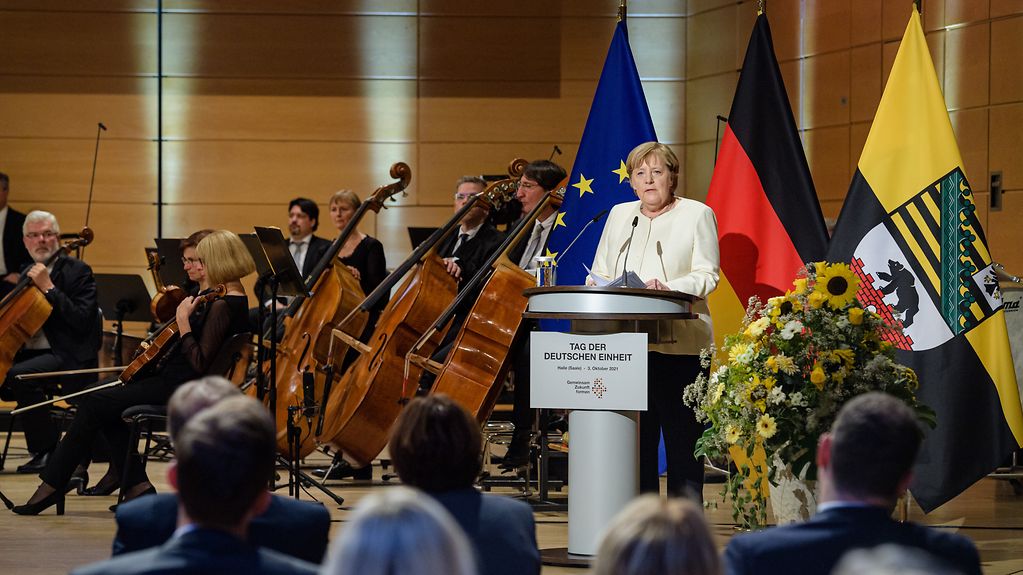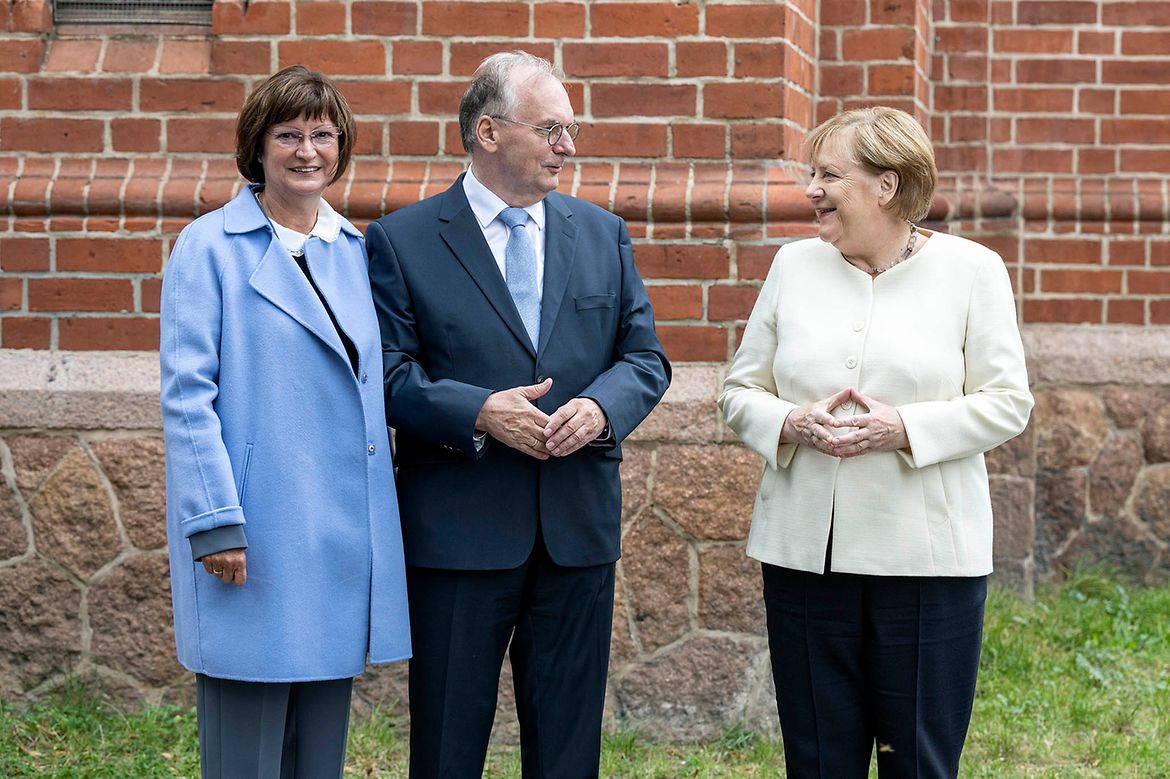Day of German Unity 2021
This year, Germany celebrated the 3rd of October in Halle in Saxony-Anhalt. In her speech at the ceremony to celebrate the Day of German Unity, Federal Chancellor Merkel stressed that democracy had to be lived out, fulfilled and protected, and that the lesson from 31 years of German unity was that people should not only respect others’ life stories and experiences, but they should also respect democracy itself.
5 Min. Lesedauer

In her speech, the Federal Chancellor said, “Democracy doesn’t just happen. We have to keep working for it together, every day.”
Foto: Staatskanzlei Sachsen-Anhalt/Schlüter
“Shaping a future together” was the motto of this year’s celebrations of the Day of German Unity, which were hosted by Saxony-Anhalt. The heads of Germany’s core constitutional bodies participated in the ceremony in the Georg Friedrich Händel Hall, joined by many representatives of the state and civil society.
Freedom “didn’t just descend upon us”
In her speech, Federal Chancellor Merkel underlined the importance of the 3rd of October as a symbol of the reunification of Germany in peace and freedom. However, Merkel also noted that this freedom “didn’t just descend upon us – this freedom was hard-won.” It was won by people in the GDR who “risked everything” for their rights, their freedom and a different society, Merkel stressed, and it could all have ended very differently. The people who took to the streets in those days to demonstrate for democratic rights had no way of knowing whether they would be “brutally punished,” Merkel said. “That is true courage.”
Merkel reminded her audience never to forget that this unity would not have been possible “without the efforts of our neighbours in central and eastern Europe” and “the support of our partners in the West”, who demonstrated a level of trust in a reunified Germany “that was by no means self-evident.”
Social cohesion is under scrutiny
Merkel’s own experiences of the Wall, Communist dictatorship, the fear of being spied on by the Stasi and the lack of freedom made her certain that democracy was something that had to be hard-won, and now had to be lived out, fulfilled and protected. “It needs us just as we need it. Democracy doesn’t just happen. We have to keep working for it together, every day.”
Merkel expressed her concern that democratic achievements are sometimes treated too frivolously. Attacks on the freedom of the press, the stoking of hatred and resentment through lies and disinformation, attacks on people and groups due to their appearance, origin or beliefs, even attacks on democracy: “Because of this, our social cohesion itself is under scrutiny,” the Federal Chancellor said.
“Diversity and difference are an expression of living freedom”
Merkel called for everyone – not just victims – to resist hostility expressed in “verbal brutalisation and radicalisation” towards those who work for the common good. Events such as the murder of Walter Lübcke, the attack on the synagogue in Halle, the shootings in Hanau and the murder of a petrol station worker in Idar-Oberstein were all signs that “verbal attacks all too quickly end in violence,” according to Merkel.
However, she noted that democracy also protected people’s individual convictions and ways of life, stressing that “diversity and difference are an expression of living freedom”. For that reason, Merkel continued, the question had to be asked “how we can protect democracy from those who disrespect and despise it.”
Almost everything changed for the East Germans
The Federal Chancellor raised another question in her speech: three decades after Reunification, did people who originated from East Germany still have to “keep proving they belonged” to a reunified Germany, “as if their history – by which I mean their lives in the GDR – was in some way a disgrace?” She drew attention to how a book had recently described her own background as a citizen of the GDR as a “burden”. Merkel also expressed her belief that, “until now, too little attention has been given to the fact that, for the vast majority of people in the West, reunification meant that things continued as they had before, while for us East Germans, almost everything changed: politics, the workplace, society.”
“Are there two kinds of Federal Germans and Europeans?”
“Depressing experiences” are another part of the story that cannot be ignored, “not least out of respect for people’s life stories.” However, Merkel added that the process of creating unity was not yet complete, so care should be taken that people do not suddenly find “their origins being used against them.” She also said that her own experience meant she had to ask if there were “two kinds of Federal Germans and Europeans: the old-timers and the trainees, who every day keep having to prove anew that they actually belong here?” Is it the case that here you have “those who have been Federal Germans forever, and over there, the others, the late arrivals who have to keep practising until they pick it up?”
Solidarity and willingness to change
Merkel stressed that Germany is a country “where everyone keeps learning new ways of living together.” It is a country where upheaval and new starts are recognised as experiences that “impart to us shared optimism and strength.” It is a country whose experiences of reunification can also help people cope with today’s processes of transformation, such as climate protection and digital progress. A country that is aware of its responsibility “that everyone needs a chance, that each and every one of us should be able to feel listened to and that they belong.” For Merkel, this sense of belonging would give rise to solidarity and a willingness to change.
“We need to respect everyone’s life stories.”
Germany needed constant renewal, she said, and the shape of that renewal “will be a rich source of debate in future.” Yet for Merkel, the answer to that question “is in our own hands.” By listening and talking to each other, Merkel saw opportunities not just to discover differences, “but above all, what we have in common.” For her, the lesson of 31 years of German unity is this: “We need to respect others’ life stories and experiences, but we also need respect for democracy as well.”
EinheitsEXPO at the Hallmarkt in Halle
The EinheitsEXPO at the market square in the centre of Halle opened its doors from 18 September to 3 October. The event brought together presentations from the 16 federal states, as well as the constitutional bodies of the Federal Government, the Bundestag, the Bundesrat and the Federal Constitutional Court. The Federal Government’s contribution took the form of a media installation at the Hallmarkt.
Young people from across Germany led the way in submitting videos responding to the question:
What unifies us today? The EinheitsEXPO included presentations of democracy projects that raise pressing questions for our society and through which people can play a part in making Germany a place worth living in. You can watch the videos that were shown in the Federal Government’s installation in our report on the EinheitsEXPO.













